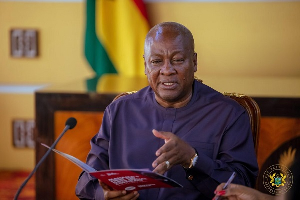Some commentators, together with politicians seeking political capital, describe the Ghana@50 celebration as a waste of national resources; which could have been better spent. This assertion is nothing more than the truth being stretched to breaking point.
Often the discrepancy between the estimated accounting-cost figure and the actual accounting-cost figure is what they brandish about as the justification for the poor description of the event. They cite the nation’s creaking economic infrastructure as the opportunity cost (i.e. the cost in terms of the benefits given up in order to make the Ghana@50 event a reality). In other words, the cost of additional health equipments in hospitals, school buildings, etc that come close or equates to the actual sum spent on staging the Ghana@50 Celebration will be money well spent, if the hospitals and the schools, etc, were the beneficiaries of this National Expenditure instead of the Ghana@50.
The Ghana@50 celebration was not a total waste of national resource as these commentators will want us to believe. The benefits are largely qualitative and long term; hence difficult to translate into monetary terms, nevertheless, they exist. Like the oxygen we breathe, we cannot deny its existence just because it’s difficult to quantify and slap cash figures on them. The event boosted Ghana National Income and Ghana’s image as the nation took centre stage in the global arena, with her celebration.
The inward foreign investment directly and indirectly linked to the event, plus tourists who poured into the country as a result of the magnetic pull of Ghana@50, and went on spending spree, all combined to boost the National Income. Hence these factors should be integral to the calculation of the benefits for the nation and not ignored with a dismissive hand. Only when proper computation of the rise in National Income due to the Ghana@50 event has been conducted, will a complete picture of the cost implication of the Ghana@50 Celebrations emerge. Merely, dwelling on the accounting cost of the event, alone, distorts the true picture. Commentators must resist the temptation to present half truths and half stories in their desire to give weight to baseless allegations.
The feel-good factor that permeated the nation, underpinned productivity in different industries and other work disciplines during the Ghana@50 celebration and must be considered as part of the short term benefits. This category will include taxi drivers who had to reach overdrive to meet demand; the street vendors who felt sales, had never been so good; the construction industry and other service organisations that employed additional hands to cope with demand directly linked to the event. The sudden increase in economic activities by the nation during the Ghana@50 celebration cannot be overemphasised and it had the effect of raising Ghana’s Gross Domestic Product (GDP) - a measure of the nation’s wealth.
The event was, also, a great advertisement for Ghana and what it had to sell to the rest of the world. Advertisement, by its nature, will always have an inherent cost, but the cost alone should not be a justification for not placing an advert in respect of a product. It is wrong to dismiss an advert on cost grounds. The justification must be measured by the long term profit accruing from product sales as a result of greater exposure due to advertisement. The commentators dismissing the `Ghana@50 celebrations’ as a waste, should remember that, like any advertisement, the Ghana@50 event has a long term benefit built into it; so it’s wrong to judge the event with short term measuring stick alone. The fact that hospitals require medical equipments, colleges need computers, roads are crying for transformation, etc, does not mean the country should abandon long term investment plans that are in the same mould as the Ghana@50 event. Most countries set aside a large proportion of their GDP to invest in Research and Development, which by its nature is full of uncertainty with no prospect of a breakthrough from start, at the expense of other vital projects required by those nations. The high risk associated with Research and Development, in terms of returns, does not deter these countries because the dividends, if they achieve a breakthrough with product development, are usually very high. Ghana should not be afraid to take a long term view with her investment like these countries. It is this practice that has characterised the massive development of the advanced countries. Ghana@50 celebration fit this mould of long term investment and the brains behind them should be congratulated for taking a bold step for the nation; instead of the character assassination that has become the national pastime.
The benefits of the Ghana@50 would be fully realised when growth in long term employment arising from capital flight into the country, traceable to the event, begin to show green shoots. The positive knock-on effect on other economic activities in the country will all push up the National Income, and increase Ghana’s ability to take care of the sick, the old, the insecure, the destitute, the unemployed, etc. In essence, the event will self-finance itself in the long run and continue to benefit the nation as Ghana’s capacity to invest in its economic infrastructure is enhanced with increased economic activity traceable to Ghana@50 event. The permanent structures erected specifically for the Ghana@50 celebration, could be used for other events beneficial to the nation for years to come. Alternatively, they could be sold to mitigate the capital cost of setting up the Ghana@50 event.
The consequent high profile of Ghana, on the international scene, emboldened Ghana diplomats to champion our interest in the diplomatic circle with renewed vigour, as they rubbed shoulder with powerful international figures, whose attention were drawn to Ghana by the Ghana@50 celebration. It is not beyond the realms of possibility that President Obama’s choice of Ghana as his first visit to Africa, since assuming the most powerful office in the world, owes much to the Ghana@50 event. Ghana’s image abroad was undoubtedly inflated by the celebration and it had positive magnetic pull for numerous things; the benefits of some of these things will not be known in the immediate future. If the American President’s visit to Ghana is connected to the magnetic pull of the Ghana@50 celebration, then the event’s benefit associated with the visit would be potentially huge.
So please, let’s get real and stop the myopic view of the Ghana@50 celebrations because it has serious long term benefit to the nation; the net cost of the event is not as bad as the headline figures suggest, if the computation take account of the economic factors mentioned above.
Kwaku Frimpong _______________________________________________________________
Opinions of Saturday, 4 July 2009
Columnist: Frimpong, Kwaku


















